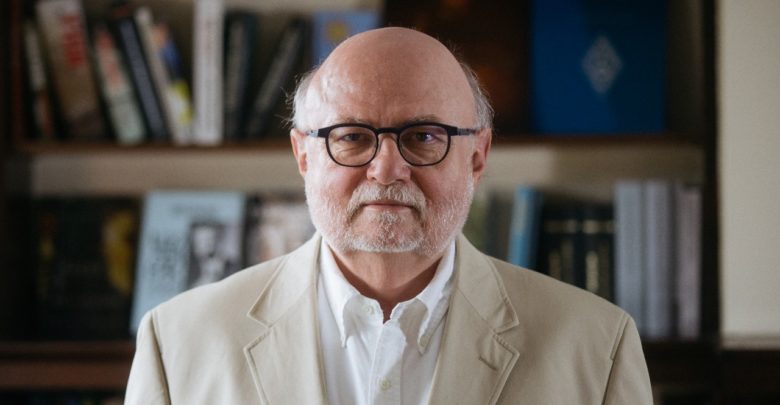 Rosty Soroka
Rosty SorokaResearchers from the University of Alberta have uncovered an array of stories telling the heroic tales of Ukrainian Canadians’ efforts to help Canada in the Second World War (WWII), both at home and abroad.
The stories were compiled for the film A Canadian War Story, which was produced by of the Ukrainian Canadian Research and Documentation Centre, and directed by John Paskievichwhich. The film debuted on November 6. Scholarly research collected by contributors from the U of A sheds light on the intricate circumstances Ukrainian Canadians faced in overcoming discrimination to pledge their devotion to Canada in WWII.
The research spans as far back as 1897, including accounts of as many as 80,000 Ukrainian Canadians being forced to register as enemy aliens during the First World War (WWI), 5,000 being interned in Canadian prison camps at the same time, and their efforts to avoid such mistreatment by the time the second world war came around.
Jars Balan, the former director of the Canadian Institute of Ukrainian Studies in the U of A’s faculty of arts and contributor to the project, said the story all starts with the efforts of Thomas Bellamy, the first Ukrainian immigrant to Edmonton in 1897, who realized early on that his people wouldn’t be fully embraced by their new country until they were willing to go to battle for Canada.
“[Bellamy] began writing articles about what was going on in the community very early on, and wrote a poem in 1903, called “To Canada”, and in it, there’s a paragraph where he says that until we die in battle for you, we won’t be fully regarded as fully Canadian,” Balan said. “In 1909, Bellamy began a campaign in the Ukrainian communities to start a Ukrainian regiment within the Canadian Armed Forces and attempted to recruit these immigrants to train and become a part of it.”
But because many newly immigrated Ukrainians fled their home country in an effort to avoid being enlisted in the Austro-Hungarian Army, Bellamy received great pushback and his initiative ultimately failed. However, Balan suggests that the ensuing mistreatment they were subjected to during WWI ignited many Ukrainian Canadians to take a different course of action when WWII came around.
“They hadn’t forgotten about their internment during the previous war, so they went out of their way to declare their loyalty and express Canadian patriotism, many of whom rushing to enlist in the Forces, propelled by this fear and desire to be fully accepted as Canadian,” Balan explained.
Although it’s believed as many as 40,000 Ukrainian Canadians fought for their country during WWII, after discovering numerous stories of Ukrainian Canadians changing their names when enlisting to avoid enduring discrimination, Balan believes that number is actually much higher.
Among many, one of the most notable examples of Ukrainian Canadians changing their names, Balan came across was of Russell Bannock, one of the greatest WWII Canadian Aces — a title given to pilots and weapons systems officers who shoot down enemy aircraft. Bannock took down 18 enemy V1’s, a type of jet-propelled missile, in addition to many other enemy aircraft.
“We found an article in the Edmonton Journal in 1944 and discovered his parents’ last name is ‘Bahnuk’ in Ukrainian,” Balan explained. “This was very common, and we can’t truly quantify how many Ukrainian Canadians there were because we wouldn’t know from their name they were Ukrainian.”
On the homefront, the devotion to Canada’s war effort by Ukrainian Canadians was also on full display. Among the most notable acts of patriotism, Balan suggests, was from Nadia Svarich, a music teacher from the Vegreville area.
“[Svarich] ended up leading a women’s band across Canada, parading and whipping up morale in an effort to promote recruitment and enlistment,” Balan said. “At the end of the war, they actually ended up taking the band over to Britain to help celebrate victory.”
Despite the continuation of discrimination against Ukrainian Canadians after the war, Balan suggests that its magnitude was greatly reduced as a result of their great acts of loyalty to Canada.
“When you have several people in the trench fighting to save each other’s lives, you don’t care about the other person’s ethnic background,” Balan said. “Instead, a bond is developed in which you see a person in a different way and get to know them.”
“You get to know these people, and kind of realize they’re normal just like we are, with their own fears, desires, hopes, and dreams, so it blunted the discrimination, I would definitely say.”
Although A Canadian War Story has already aired, Balan urges those who are still wanting to watch the production to visit their website to place an order, as the important story it portrays was years in the making.
“35 years ago, there was an interest in doing something on the Ukrainians that served during the Canadian Armed Forces during the war, especially because of the key role a bunch of them played in rescuing Ukrainian refugees from the displaced person camps in Europe,” Balan started. ”A number of interviews with veterans were conducted but unfortunately just sat in the vault for decades, until several years ago a retired captain in the Canadian Armed Forces decided to take the bull by the horns and convey the heroism of Ukrainian Canadians in this film for everyone to see.”




